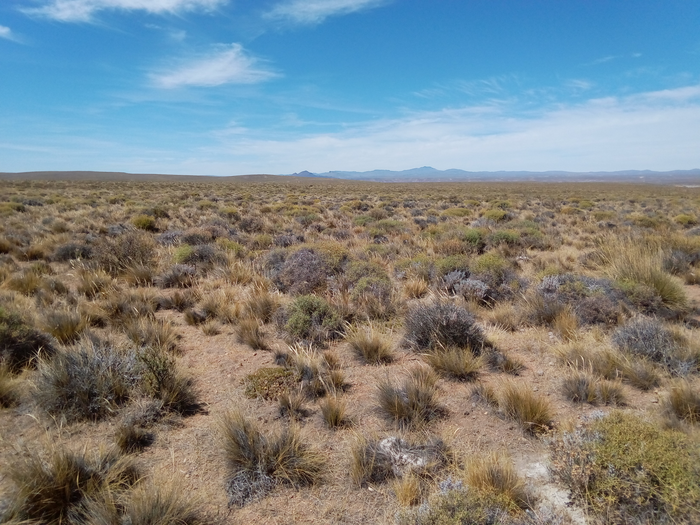A new study published in Science reports results from the first-ever global field assessment of the ecological impacts of grazing in drylands. The international research team found that grazing can have positive effects on ecosystem services, particularly in species-rich rangelands, but these effects turn to negative under a warmer climate.

Credit: Juan José Gaitán
A new study published in Science reports results from the first-ever global field assessment of the ecological impacts of grazing in drylands. The international research team found that grazing can have positive effects on ecosystem services, particularly in species-rich rangelands, but these effects turn to negative under a warmer climate.
Grazing is an essential land use that sustains the livelihood of billions of people and is tightly linked to many UN Sustainable Development Goals. Grazing is particularly important in drylands, which cover about 41% of the Earth’s land surface, host one in three humans inhabiting our planet and over 50% of all livestock existing in our planet.
Despite the importance of grazing for humans and ecosystems, to date no previous study had attempted to characterize its impacts on the delivery of ecosystem services at the global scale using field data. For doing so, an international research team of more than 100 specialists, led by Dr. Fernando T. Maestre (University of Alicante, Spain), carried out a unique global survey conducted in 326 drylands located in 25 countries from six continents.
“We used standardized protocols to assess the impacts of increasing grazing pressure on the capacity of drylands to deliver nine essential ecosystem services, including soil fertility and erosion, forage/wood production and climate regulation. Doing so allowed us to characterize how the impacts of grazing depend on local climatic, soil and local biodiversity conditions, and to gain additional insights on the role of biodiversity on the provision of ecosystem services essential to sustain human livelihoods”, says Dr. Maestre, director of the Dryland Ecology and Global Change Laboratory (Alicante, Spain).
Researchers found that the relationships between climate, soil conditions, biodiversity and the ecosystem services measured varied with grazing pressure. “The effects of increasing grazing pressure on ecosystem services were mostly negative in warmer drylands. These results highlight the importance of managing grazing locally, to cope with ongoing climate change in drylands, a particularly important issue in oak woodlands (montados) that we studied in Portugal and were part of this work” points Dr. Alice Nunes from the Centre for Ecology, Evolution and Environmental Changes – cE3c, at the Faculty of Sciences of the University of Lisbon (Ciências ULisboa) and coauthor of the study.
The impacts of increasing grazing pressure shifted from mostly positive in colder drylands with a lower rainfall seasonality and higher plant species richness to negative in hotter drylands with lower plant diversity and higher rainfall seasonality. “There is no one-size-fits-all when it comes to grazing in drylands. Any effects of grazing, particularly overgrazing, will vary across the globe, making it important to consider local condition when managing livestock and wild herbivores” says Dr. David Eldridge from the University of New South Wales (Australia) and coauthor of the study.
The authors also found positive relationships between plant species richness and the delivery of multiple ecosystem services such as soil carbon storage, erosion control, and both forage quality and quantity, regardless of grazing pressure. “Our results highlight the importance of conserving and restoring diverse plant communities to prevent land degradation, ensure the delivery of essential ecosystems services for humans, and mitigate climate change in grazed drylands”, says the PhD student Melanie Köbel from cE3c at Ciências ULisboa and coauthor of the study.
The findings of this study are of great relevance for achieving a more sustainable management of grazing, as well as for establishing effective management and restoration actions aimed at mitigating the effects of ongoing climate change and desertification across global drylands.
This work has been carried out as part of the BIODESERT project, awarded by the Consolidator Grant program of the European Research Council (ERC) to Fernando T. Maestre. “I am very grateful to the ERC for supporting this global survey, as such a high risk-high gain project would have not been possible without the generous funding and freedom that comes with an ERC grant. And of course, it would not have been possible without our network of international collaborators, who provided their expertise, resources, and work to survey sites in their respective study areas. The BIODESERT survey also provides a very nice example of the power of global and collaborative research networks to conduct frontier research”, says Dr. Maestre.
Journal
Science
DOI
10.1126/science.abq4062
Article Title
Grazing and ecosystem service delivery in global drylands
Article Publication Date
24-Nov-2022




